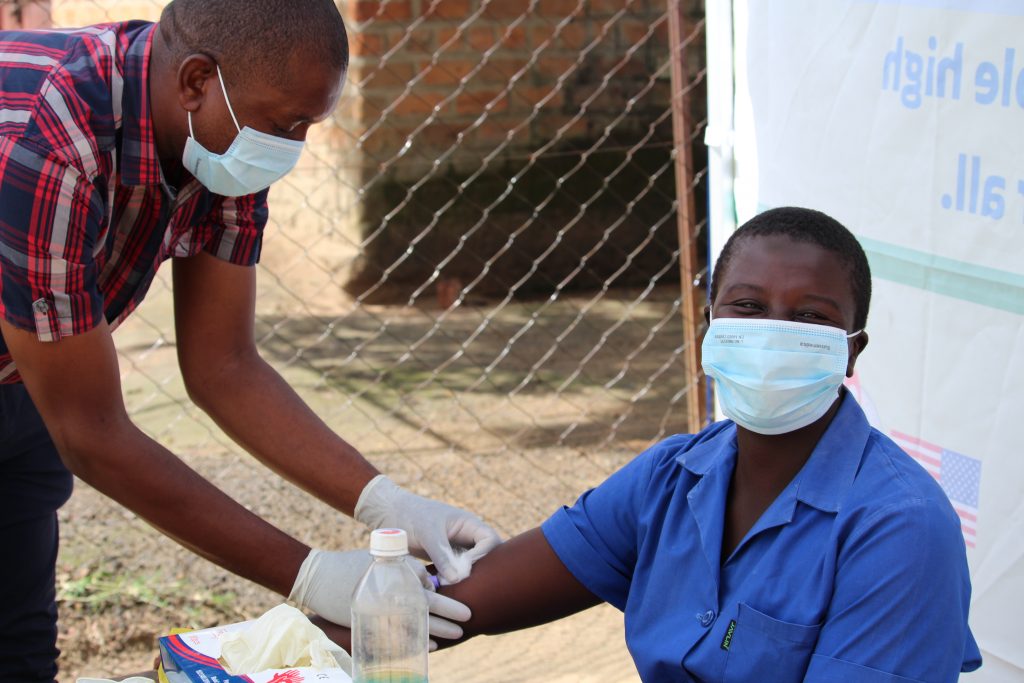
Located approximately 155 kilometres away from the Capital city, Harare, lies Guruve, one of the eight districts in the Mashonaland Central province of Zimbabwe. The district capital is the town of Guruve and around 25 kilometres away is Kachute Clinic where Zim-TTECH offers Technical assistance supporting the Ministry of Health and Child Care.
In a bid to improve viral load coverage, Zim-TTECH supports Quality Improvement initiatives to its DSD and TA sites. The Quality improvement team focuses on processes and systems, use of data to improve services, and use teams to ensure quality.
Kachuta Clinic has proved to be one facility that is doing well since the roll out of Clinic Lab Interface QI initiative, as the team has proved to be a force to reckon, with a well-documented QI corner in place with the run charts well plotted up to date with annotations.
“We have monthly team meetings, where we update each other on any issues arising during the course of that month, we set our targets and we do not work in silos. If one of us is not available then anyone among the team members can assist,” said Sister Zvidzayi Munyaradzi, the OI focal person.
These monthly meetings link and allow flow of information within the facility from the Testing area, OI desk and the Laboratory Department as well as allocation of roles and responsibilities.
It is during these meetings that the team, comprising the Nurse in charge, Primary Counsellor, OI Focal person, Primary care nurse and the Microscopist share information, responsibilities, check achievements, go over registers and note areas of collaboration. The NIC appoints one of the nurses to be the focal person of the OI/ART clinic.
Mr Mupezeni, the Microscopist highlighted how the rollout of CLI QI has assisted the facility as they are now able to book the clients in the appointment diary using code3, documentation of the Facility viral load register and transmittal register, identify clients who are due for Viral load sample collection as well use of the Vacutainer system on plasma collection,

“It used to be difficult to track clients due for Viral load, but ever since we rolled out QI and adopted the cohort system it is now easy. We are now able to identify challenges and problems quickly as a team. As I chat to you right now, I can confidently say I can use the Vacutainer system for plasma collection after demonstration during CLI roll out,” said Mupezeni.
“We have clear follow up procedures, and we refer to our registers for any information needed. This is because our documentation in the registers has improved due to QI mentoring and support from the coaches,” he said.
“Drug pick up has also improved, if a client does not show up, we do follow up as this is easy to track in our registers. We have a clear appointment system in place which is very effective and a follow up of missing results tool is in place. For instance, when we send Viral load samples to the District hospital sometimes not all results are sent back to us, so we have a tool that we designed with client details that we will use to follow up on the missing results,” He said.
The Kachute team has proved to be effective as they do not work individually but as a team. This can be evident by the amount of time they have clients at the facility, they work swiftly together as a team and every team member is aware of what needs to be done and how. With walls amassed with charts and graphs, the clinic uses facility-level data to monitor the progress of the QI project using the plotted graphs.
“We do not encourage specialisation at this facility because what happens when the person specialising in a certain area is not around. We do not want to short-change our clients hence we encourage each team member to be and all-rounder,” said Sister Munyaradzi.

It was on the 5th of September 2017, in the evening, when Lucienne (41years) decided to administer an HIV self-test in the comfort of her home together with her husband. Like all the other days, after hectic farm work, Lucienne was tired and wanted to rest but after visiting her best friend who is the Village health worker who gave her an HIV self-test kit, she wanted to do the test that night and get it over and done with.
“I remember the day and time vividly, the 5th of September 2017, around 8 pm in the evening. 20 minutes later the results came in, and we were all HIV positive. We could not believe it at first. How can a self-test kit show that we were both positive? It could not be,” she said.
After a week of deep thinking and chatting to a close friend who advised her to visit the nearest clinic, Lucienne decided to do another test at the local Nyameni clinic in Marondera,
“My husband tagged along, though he was skeptical about it, we were both scared, but we had to be certain and sure of our HIV status. The results came and we were all HIV positive. That is when reality sunk in. We were so angry with each other at that moment,” she said.
“We were quickly initiated on ART. Back home, our Village Health worker who is also a friend stood with us and assisted us with all the information we needed, we forgave each other and started to live positively,” said ever-smiling Lucienne.
Lucienne and her husband are well known at Sambok farm as they live an open life, they do not hide that they are living with HIV and take their medication openly.
“I am not ashamed of my status, my children know our status, and taking our medication is a family business, my children remind us every day of the need to take our medication religiously,”
“Being HIV Positive is not the end of the world. One can live a healthy and normal life if they adhere to taking their medication as prescribed,” she said.
Zim-TTECH, under the Zimbabwe Partnership, to Accelerate AIDS control consortium, strives to reach hard-to-reach communities through Community outreach approaches where clinical services are provided to the community. Services such as Viral Load sample collection, HIV testing, Cervical cancer screening, ART Refill, Condom Distribution, and PrEP initiation and uptake are provided during the outreach.
Lucienne gets her Viral load sample collected, ART Refill, and Cervical cancer screening services all at once.